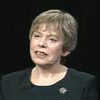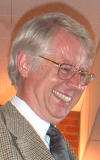|
|||||
|
|||||
 |
Holy Wars - The Battle for God by Karen Armstrong. New York Times review. Outlines the basics of Fundamentalism
in Christianity, Islam and Judaism as a reaction against modernism and
liberalism. First Chapter of the Book. Cries of Rage and Frustration - New Statesman article by Karen Armstrong. Explaining fundamentalism as the result of war between liberal and conservative and its current connections to war and violence. |
 |
To buy this book at Amazon.com, Amazon.ca, Chapters.ca Also check into the new Google service Google Book Search. |
 |
Holy Manners The background on the phrase and why we have adopted it. The guidelines for our studies. |
 |
Internet Discussion Group at Yahoo - the St. David's Forum. The archive is public and readable. Participation is by invitation. Click HERE if you would like to join. You will then be able to post your own responses to the list and will be emailed the notices and contributions of the others. Click left to visit the archives of the site (read only). There are presently 88 persons. |
 |
7 Book Reviews by Wayne Holst on subjects related to the present study.. |
 |
The Internet Reference Collection Research Page for this study 41 relevant articles/sites to background, supplement and update the book. |
Author. Karen Armstrong Karen Armstrong spent seven years as a Roman Catholic nun in the 1960s, but then left her teaching order in 1969 to study English Literature at the University of Oxford. In 1982, she became a full time writer and broadcaster. Her books include: Holy War,The Crusades and their Impact on Today’s World [1988]; Muhammad, A Biography of the Prophet [1991]; A History of God [1993], which became an international bestseller; The Battle for God, A History of Fundamentalism [2000]; Islam,A Short History [2000]; and Buddha [2000]. Her books have been translated into forty languages. Since September 11th, however, she has become chiefly known for her work on Islam and Fundamentalism, particularly in the United States. Islam and The Battle for God immediately became national best-sellers there, and she was given more time on the American media than almost any other scholar in the field. She has addressed members of the United States Congress on three occasions, has participated in the World Economic Forum in New York and Davos, and was one of three scholars invited to speak in the United Nations in the first session ever devoted to religion in that body. |
|
Group Facilitator. Wayne Holst I spent most of my life thinking like a church professional, rather than as a regular congregational member. My training as a pastor always had me asking myself 'how can I apply this discovery, insight, new information to a regular church setting?' Often, clergy have been hesitant to share the discoveries they have made through a 'critical' approach to the Bible with their parishoners because they wonder how laypeople might accept it. I have found that many thinking laity are professionals in their own fields of endeavour and understand a critical approach very readily. What they seek are ways of relating faith to daily living. I am grateful for the journey I have been taking through ordained ministry to teaching at the university and serving as a fellow layperson at St.David's United Church. Here we find that questioning and honest expression of our faith and doubt is readily accepted and supported. EMAIL WAYNE |
|
Group Facilitator. Jock McTavish I am a student and a poet, a democrat and a techocrat, an eclectic eccentric. I grew up in a loving Baptist community, so in my heart I'm still a Bible loving evangelical. As I grew in learning I found a new home in the United Church whose tolerance embraces the broadest range of Christian understanding. I most enjoy the illumination of our ancient traditions by modern scholarship. For they show in clear novel ways that the perspectives of the Special Ones were seldom the understandings of those that followed. They show all knowledge to be in relationship . There seems a lack of understanding in our secular world for religious practices. The reasons why I still gladly - even necessarily - attend church are difficult to voice to those unfamiliar with church, or those injured by church. Elliott got it right. We find our way back to the place we started from. But with new understanding. EMAIL JOCK |